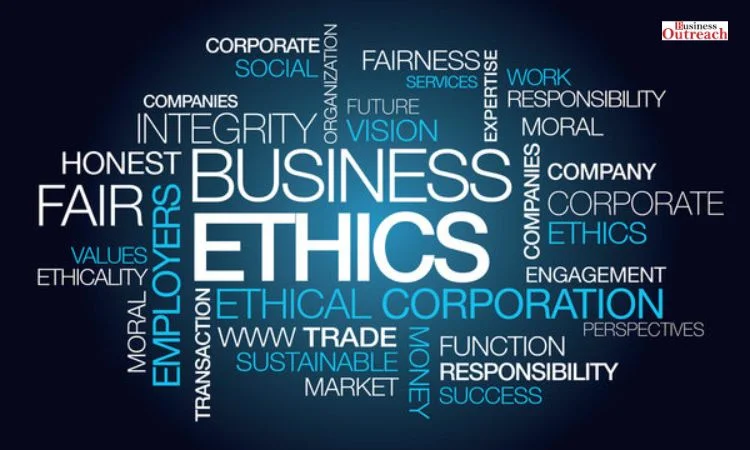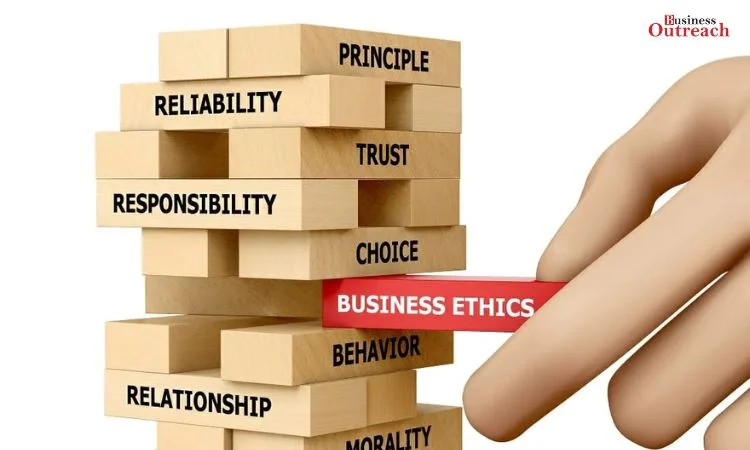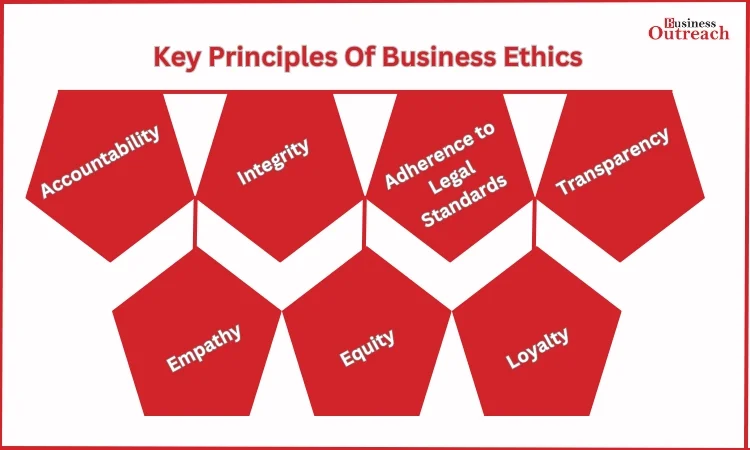In a commercial world which is crowded with cutthroat competitors and moneymaking is the name of the game, kindness can often take the back seat. But ethical things are of major importance. It is moral action to be ethical, and moral action will make business go on well. It denotes being fair and sound. If the business acts ethically and is transparent, then its usual business partners and customers can judge it as trustworthy.
In this article we(Business Outreach) explore business ethics in full detail.
| Table of Contents |
| 1. Introduction |
| 2. Understanding Business Ethics |
| – Business Ethics: What Is It All About ? |
| – Evolution of Business Ethics: From 1960s Origins to Modern Practices |
| 3. The Benefits of Business Ethics |
| – Business Ethics: Enhancing Reputation, Talent Attraction, And Customer Trust |
| 4. Why Business Ethics Matters |
| – Business Ethics: Why Do We Need To Know? |
| 5. Key Points |
| 6. Foundational Principles of Business Ethics |
| – Business Ethics: Some Basics Principles |
| 7. Key Principles of Business Ethics |
| 8. Illustrative Examples of Business Ethics |
| 9. Conclusion |

source: Adobe Stock
Business Ethics: What Is It All About ?
Business Ethics refers to the foundation of moral principles which confirms the behavior of a company. Business ethics is the act of acknowledging the wrongs and rights in company behavior. This set of rules exactly controls all the business activities of the firm from the interaction with government authorities to other business partners, employ staff as well as the way it treats its customers. The business entities then make use of these most underlying principles as a guiding light to help them from this standpoint to deal with such issues and dilemmas.
Evolution of Business Ethics: From 1960s Origins to Modern Practices:
The 1960s era witnessed a surge in corporate consciousness towards consumer products acknowledging the environmental concerns, social welfare and accountability issues. Ethical codes were born to govern the ethical behaviour for corporations during this era. The moralists of this era had a particularly keen eye on these “social evils”.
The theory of business ethics has undergone tremendous changes since its inception. Such conduct does not only endorse legal obligations with morality, but also is a delicate dance between the need to be competitive and the need to obey. Businesses do this through a number of ways that in practice show their ethical standards.
Business Ethics: Enhancing Reputation, Talent Attraction, And Customer Trust
Business ethics are a primary factor in keeping companies in check with all rules and regulations that are existing thereby, maintaining the good posting of the company in peer analysis while reducing the legal risks. Furthermore, the ethical behaviors of the organisation evidence in its recruiting process play a key role in developing its employment brand.
Positions that lend their priority to the ethical treatment of the employees often grasp their attention more and bring subsequent rewards in form of longer work retention and lower expenditure on the process of recruitment and training.
The second argument in favour of ethical standards is the fact that they contribute to the trust that a business has with customers or even clients. Thus the long time relationship is finally created. Customer satisfaction leads to repeat business and a higher probability of positive brand advocacy, especially within the person’s social circle.
Business Ethics: Why Do We Need To Know?

Source:Corporate Finance Institute
Here are some key points to consider:
| Key Points |
| Trust Building |
| Ethical Decision-Making |
| Global Adaptability |
| Reputation Management |
Trust Building:
The grasp of ethical standards is a driving force of the development of trust-relationships among clients, employees, and partners. Trustworthiness is a basis for healthy relations among stakeholders within the sphere of both reliability and honesty.
Ethical Decision-Making:
Business ethics teaches people the appropriate criteria to deal with difficult occasions and to know whether or not the possibility of action is correct, an ability that is often essential for business. This way is to promote individual utilization of ethical compasses that is the ability to reason out worthy decisions.
Global Adaptability:
Ambassadors of learning and ethics in this context, business professionals will become greatly proficient and successful in their performances if they accommodate their global businesses to the prevailing ethical norms. Adaptability is an important issue in this matter because every country has its unique features. This adaptability helps in navigating international markets and creating a good credit in different cultural contexts.
Reputation Management:
Ethical business conducts which lead to the formation and maintenance of trust with stakeholders are mechanisms that give rise to a favourable public image of the company in the minds of the end user. An ethical conduct carrying the name is the one associated with long-term success and it allows clients and partners to be more inclined to work with you.
Business Ethics: Some Basics Principles

A good understanding of the basic ethical principles that are key in building an organisation culture of integrity among both the employees and the organisations they are affiliated to is a requisite part of ensuring that there is a good work ethic in the organisations. In this sense, not following these ethical codes would usually be the main reason for ending a person’s career in the public sector and affecting the organization’s name as well.
Here Below Are The Some Key Principles Of Business Ethics
| Key Principles |
| Accountability |
| Integrity |
| Adherence to Legal Standards |
| Transparency |
| Empathy |
| Equity |
| Loyalty |
Accountability: Maintaining to be the individual who keeps others answerable for their conduct and their devotion to ethical rules which may extend to instilling discipline and compliance among others. Cultivate an atmosphere of accountability in the organization empowering the employees to be responsible while also the managers to be accountable to their higher responsibilities.
Integrity: Hence, being loyal, pure and dependable, integrity is the backbone of the moral standard. Those with character stability consider the appropriateness of the act and analyze their behavior continuously to fulfill the elevated codes of conduct.
Adherence to Legal Standards: Ethical leadership requires maintaining all applicable local, state, and federal law. Thus, employers should take caution not to breach legal standards under any particular legal context. While offering alternatives in cases when legal ambiguities appear is crucial, leaders should also give top priority to the legality of their decisions and resist giving in to any loopholes in the law.
Transparency: Stakeholders such as shareholders, workers, local community members, and employees’ family have non negligible interest in a business. Companies need to ensure the separation of confidential elements from the information they are disclosing without leaving stakeholders curious about financial performance, pricing, employment practices, compensation structures, and their marketing activities.
Empathy: Being empathetic to different employee’s emotions is one thing that is mandatory for a compassionate society. When people care about the surrounding communities, business friends and customers they will try their best to improve their situation and increase their quality of living.
Equity: Maintenance of a fair society in which every one has equal chances is possible through upholding fairness principles and treating everyone equally. Each act and any form of violation dealing with the equality, common courtesy or agreeable attitude are incorrect and, thus, should be taken under the constitutional control.
Loyalty : This is one of the most important leadership skills being showcased with display of confidence and other traits such as purposefulness and reliability to workforce and establishment as well. Promoting a culture of loyalty between staff and management as well as the collective goal of implementing best practices and realizing shared goals serving as medium for these two parties to coordinate better.
Also Read: Building and Managing Business Credit for Startups and Small Companies With Its Benefits
Business Ethics: Some Examples
Data Protection:
In the modern business landscape, there is an accumulation of customer data which is generally a standard practice. These could be varied data factors, e.g. basic contact specifics (like email addresses) as well as more complicated ones (such as physical address) OR even sensitive information your industry and operational needs may require.
Since the companies take the position of the custodians of such data, the companies are entrusted with the reliable handling of this information implying the readiness of this data to be used only after an explicit consent from the people it involves. On the other hand, availability of the employee records is also an imperative aspect of ethics that businesses must create their own culture for who and in what capacity are the right people with access to this information.
Customer Prioritization:
The component of business integrity related to business integrity involves customer satisfaction which incorporates the factor of putting up everything at their disposal and addressing their concerns with agility and promptness. Being available to satisfy customers and therefore tackling each problem or complaint in a quick and sympathetic manner even if it means becoming the problem’s owner or inconveniencing the company is the proper way to demonstrate a dedication to customer satisfaction.
For example, in situations that even one of the customers gets disappointed about the products and the services they receive, businesses normally try to do the best possible – rewarding the client with a similar or better product replacing the defective one, giving them their money back, or eventually refunding their paid sum.
By prioritizing customer needs, businesses not only uphold their reputation but also foster loyalty and trust among their clientele.
Workplace Diversity
Emphasising fairness and uniqueness businesses have the goal of making their workforce understand the value of getting different people. To be practically inclusive at work one needs to recruit with the goal of providing everybody equal chances of employment omitting any prejudices, ethnic, gender or social origin. This may require additional time, but it will pay off as many of the benefits stem from the hiring.
To bring many different opinions and experiences into the decision-making process will be the role of a rather diverse workforce and thereby make it a lot richer to stimulate innovation. Apart from that, the campaign strongly shows the firm’s willingness to advance equality and accept people with all their differences at work as well as with the society in relation to different spheres of life.
Environmental Awareness
Such companies often put the environment first in their corporate practices, identifying strategies for waste reduction and control of human impact to the local environment. The most common strategies aimed at cutting air travel and promoting virtual meetings with the development of teleconferencing tools as a possible choice to minimize Carbon emissions. Likewise, in many offices across the country, employees engage in office recycling programs to ensure only the recyclable materials get trashed.
Employee Compensation
In terms of employee compensation, in a company that represents equity and dignity values, they try to align the salary paid with job attributes like experience, qualifications, and expected responsibility. Fair and consistent market value analysis happens as part of regular evaluation which ensures compensation remains in line with market trends as well as employee input. In addition to that, it is their practice to give out performance- based bonuses that they use as motivation to make employees work to their best. This helps in improving the productivity of the employees over time. Moreover, these bonuses make employees feel appreciated, thus they value what the organization offers them.
* If You Want To Make Your Business Better And Learn Useful Strategies, Join Us(Business Outreach Magazine).
Conclusion
In conclusion, business ethics serve as a guiding force to ethically permeate the world of business ethics and at the same time, to uphold moral principles and values of societies. Leaving ethics as the number-one-on the list of the priorities may result in the creation of a more trusted firm with a better image and more ethical business environment.















